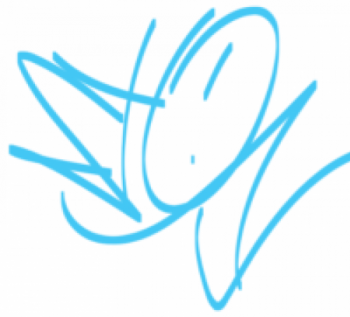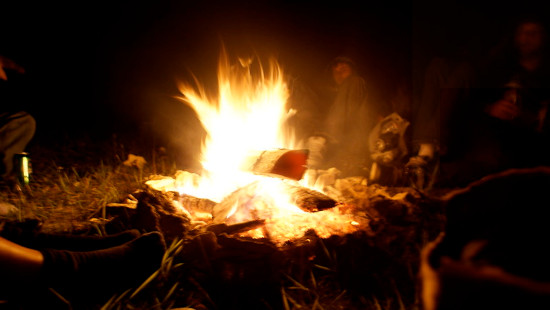On my trip to the Polish Baltic Sea this summer, I spent a few days at a campsite. Not far from the sea, just a few minutes through the forest, there is a wonderful mix of yurts, new and old wooden huts, inflatable tents, camper vans, and a few motorhomes.
For most of the campsite staff, it’s a summer job. They all looked a bit like they were from the 1970s when this campsite was founded; none of them are over 30. Only the caretaker and the cleaning staff were older. Added to this was the diversity of visitors: children with families, young backpackers, dropouts on a stopover, and an older motorcycle gang – a healthy mix of everything.
At the back of the site was a fire pit surrounded by stones. There were three benches around it, with room for twelve people, so no one had to sit on the ground. I spent almost every evening there, talking to strangers from whom I learned a lot.
I spoke with a Belarusian man who had four children and had emigrated to Warsaw, Poland, for political reasons. He enjoyed the campsite, the peace and quiet, and nature. I sat with him by the campfire while he held his four-month-old child and looked after his two other children by the fire, a multitasking phenomenon. We talked about Kaliningrad, which he called Königsberg. He knew that a mountain had been built in Berlin from the rubble of World War II, he found Teufelsberg impressive.
On the second evening, I talked to a Polish man who was a single parent, had lived in Ireland, and had already worked in Germany. He currently can’t find a decent, well-paid job in Poland. When he earned euros, his money was worth more in Poland. He feels that the cost of living in Germany is cheaper than in Poland. And he asked if I vacation in Poland because it’s so cheap. As a truck driver, he spoke very good English.
On another evening, a Czech musician played the guitar and sang Czech songs. He was in a band. His friends, who were all in a band together, were also sitting around the fire. In addition, everyone has their own band, a kind of mixed music collective. The guitarist spoke good English. The other musicians who sang along read the lyrics from their smartphones.
Poland is the only country in the world that has disappeared and risen again. It has great respect for space and time, for respecting other people’s space and letting people be, now. Living in the moment is widespread. Perhaps transience is unconsciously anchored in the Polish soul. Dancing is more prevalent; those who start dancing win and always get a smile. Being a DJ over the age of 80 is more than desirable.
I also spoke with a job agent who lived in a motorhome covered in graffiti on both sides. On one side was “Love” and on the other side was the name of his company, “Forkers Team.” He had an electric saw with him, which he used to cut wood for the campfire. He is originally from the Karkonosze Mountains. He brought a hookah to the fire. I asked him where his next trip would take him. He doesn’t have any plans yet, they just want to go to a classic car festival in Szczecin in October.
That same evening, two women were sitting by the campfire. One of them had lived in London and the other lived in Warsaw. They wanted to know which places I liked best in Poland. One of the women was a teacher and talked about patience. They both had young children and let them play alone in the dark at the campsite.
That same evening, a gay couple from London, who were originally from Poland, joined us around the campfire. They came over and asked everyone if we were having a good time. During the conversation, they mentioned the large Polish community in England, over 1 million Poles live in the UK. Many emigrated there in the 1990s.
The two were interested in why I had traveled so much in Poland. Because I grew up in old West Germany, and although Poland is just as much our neighbor as France, it was never a travel destination for me. Besserwessis (know-it-alls from West Germany) contributed significantly to Poland’s image, thanks also to the entertainer Harald Schmidt. This made me all the more interested in Eastern Europe after the fall of the Berlin Wall, especially in the last 10 years.
If I had to choose a city with few tourists that is nevertheless modern, lively, and vibrant, Wrocław would be my favorite. Its proximity to the Karkonosze Mountains and the outdoor opportunities that come with it. The size of the city, the many young people, the universities, the Oder River – simply the vibe. But also the love for the reconstruction of the beautiful old town. I would recommend it to my children for studying.
Both mentioned that many of their friends now rate the quality of life here as high as it is in England, and some have returned and are staying. They hardly hear of anyone wanting to emigrate anymore.
On the way back to Germany, at the border in Frankfurt/Oder, I stood on the highway for half an hour waiting to enter the country. There was plastic waste everywhere, on both sides of the road. It was as if the anger about German border controls was spreading in plastic. Perhaps all the plastic waste should simply be sent to Bavaria, to Alexander Dobrindt’s personal address. It could certainly be used to build a mountain of trash. Alternatively, the accumulated 500 million euros in toll debts for which Dobrindt is responsible could be financed with the recycled plastic.
Poland is struggling with global duality, politically and culturally, like many countries that are facing a rollback.
I spoke with Stanislav, who emigrated to Canada in the 1990s and spends his summers vacationing in Poland. He espouses almost all of the talking points of the neo-right, from migration and climate change to racism, coupled with a great fear of the future and an unreflective hatred of diversity in being and thinking.
The next day, I met him on the beach, the day he was leaving. He asked me what I thought about Germany becoming such a diverse country. Germany has always been a crossroads country, in the middle of Europe, an open, decentralized cultural nation. Our borders have shifted several times. There have always been refugees, both leaving and entering the country. Germany is more globally connected and intertwined than ever before.
Today, the English, French, Poles, and Germans are more closely connected militarily than ever before. Who would have thought that after 1945? Putin and Trump underestimate the EU. The two deeply, emotionally childish, narcissistic men will soon be history.
That is the wonderful thing about Europe. It is too colorful for the neo-right. Anyone can work and live in another country, just a few hours’ drive away. The brain drain in the rollback countries is already gathering momentum, economically, politically, and culturally. Hungary is a harbinger. Trump’s America and Putin’s Russia it’s weekend daddy. Corruption and fear are the rollback’s virus. Welcome to the year 2025, I said to Stanislav as he left.
I asked him if, as an immigrant to Canada, he knew what it meant to be a stranger in his own country. I asked him if he thinks it’s good that he can move freely and enter other countries. Or that he can work in another, new foreign country that has accepted him as a Polish economic refugee. Isn’t Canada also a mixed country? Which mix do you belong to?
He didn’t answer this glaring contradiction of his identity; I left it at that.


I hope we can embrace more dialog and camp fires in 2026. Thanks for your thoughtful experience
Listening is a quality that connects us rather than divides us into duality. Plus a camp fire is warm.